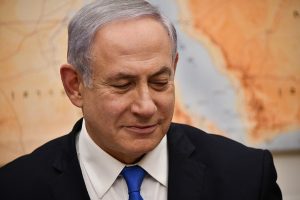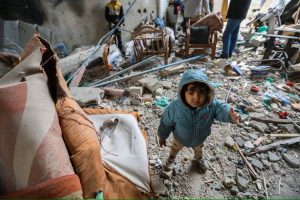Why Blair should also face the wrath of liberated Libya
By Eamonn McCann
Wednesday, 26 October 2011
Watching the foot-age of Gaddafi’s last moments, a friend with no particular interest in politics turned to me and said: "You’d have to feel a pity for any human being treated like that."
But not necessarily. The most disturbing images of the past week were not of Gaddafi wounded and helpless being kicked to pulp and flung across the bonnet of a truck for the small mercy of the coup de grace, but the broad smiles of a number of television journalists as they reported the news.
The display of Gaddafi’s body on a slab in a freezer in a Misrata vegetable market for the cameras to linger on was the calculated crowning indignity.
Beside him lay the body of his son Mutassim, filmed shortly before he was killed smoking a cigarette in a cell, apparently uninjured.
Gaddafi inflicted worse on his enemies, it might be argued, and Mutassim must have been complicit. Does that make it okay, then?
It may be a mitigating circumstance that the maiming and killing wasn’t done in cold blood, but by fighters who had come through a welter of danger and may have been seized by frenzy at having Gaddafi in their clutches at last – unlike the controlled circumstances of the torture perpetrated by Gaddafi’s goons on prisoners in bunkers far out of sight of television cameras. But not everybody is entitled to make this comparison.
On September 4, researchers for Human Rights Watch (HRW) gained access to the Tripoli headquarters of the Libyan foreign ministry and discovered documents which threw light on the real attitude of powerful interests in the West towards torture under Gaddafi.
Why Blair should also face the wrath of liberated Libya
By Eamonn McCann
Wednesday, 26 October 2011
Watching the foot-age of Gaddafi’s last moments, a friend with no particular interest in politics turned to me and said: "You’d have to feel a pity for any human being treated like that."
But not necessarily. The most disturbing images of the past week were not of Gaddafi wounded and helpless being kicked to pulp and flung across the bonnet of a truck for the small mercy of the coup de grace, but the broad smiles of a number of television journalists as they reported the news.
The display of Gaddafi’s body on a slab in a freezer in a Misrata vegetable market for the cameras to linger on was the calculated crowning indignity.
Beside him lay the body of his son Mutassim, filmed shortly before he was killed smoking a cigarette in a cell, apparently uninjured.
Gaddafi inflicted worse on his enemies, it might be argued, and Mutassim must have been complicit. Does that make it okay, then?
It may be a mitigating circumstance that the maiming and killing wasn’t done in cold blood, but by fighters who had come through a welter of danger and may have been seized by frenzy at having Gaddafi in their clutches at last – unlike the controlled circumstances of the torture perpetrated by Gaddafi’s goons on prisoners in bunkers far out of sight of television cameras. But not everybody is entitled to make this comparison.
On September 4, researchers for Human Rights Watch (HRW) gained access to the Tripoli headquarters of the Libyan foreign ministry and discovered documents which threw light on the real attitude of powerful interests in the West towards torture under Gaddafi.
There’s been little mention of these revelations in the comment and coverage of recent days – not even when Tony Blair popped up to hail the overthrow of Gaddafi and hope it would speed the spread of the Arab Spring.
This is the man who, even as hundreds of thousands gathered in the name of freedom in Tahrir Square, issued a statement praising dictator Hosni Mubarak as "a force for peace and stability".
HRW discovered a letter, written in 2004 by the head of MI6’s anti-terrorism division, Mark Allen, to Moussa Koussa, head of the Libyan intelligence service, welcoming news of the ‘safe’ arrival in Tripoli of anti-Gaddafi activist Abdelhakim Belhadj, who had been kidnapped in Malaysia by the CIA, on the basis of intelligence supplied by MI6, and ‘rendered’ to the Libyans for torture.
"This was the least we could do for you and for Libya to demonstrate the remarkable relationship we have built over recent years," wrote Allen. His regular letters to Koussa began "Dear Moussa". One, dated Christmas Day 2003, was signed, "Your Friend, Mark".
The correspondence makes plain that Belhaji was far from the only Libyan whose torture was aided and abetted by the British and US intelligence services.
The Allen-Koussa exchanges took place in the period immediately preceding Blair’s first visit to Gaddafi.
The rendition of another opponent of Gaddafi, Sami al-Saadi, kidnapped in Hong Kong with his wife and four children and held for three days in the Maldives, coincided exactly with Blair’s desert jaunt.
Saadi and his wife were handcuffed and hooded for the journey onwards to Tripoli. He says their children, girls aged 14 and six, boys of 12 and 10, "cried and screamed" all the way.
His wife and children were released after two months in a Tripoli jail. Saadi was held and, he says, tortured for six years.
The sequence was this: Saadi family kidnapped; Blair meets Gaddafi and signs half-billion pound oil exploration deal; family delivered to Tripoli. Work it out for yourselves, people.
Very soon after these events, Allen was knighted on Blair’s recommendation. Very soon after that again, Sir Mark resigned his job with MI6 and went to work for British Petroleum, then jockeying at the front of the pack for a share of the contracts now becoming available as a result of the improvement in UK-Libyan relations which Blair and Sir Mark had done so much to promote.
MI6 has let it be known that everything done by Allen and others complied with "ministerially authorised Government policy".
In other words, the Blair Government gave the thumbs-up to torture. Last I’ve heard, Sir Mark isn’t crouching in his home besieged by journalists demanding that he explain his role.
Nor is Tony Blair travelling in disguise accompanied by a SAS bodyguard for fear of angry opponents of torture dragging him from his limousine.





